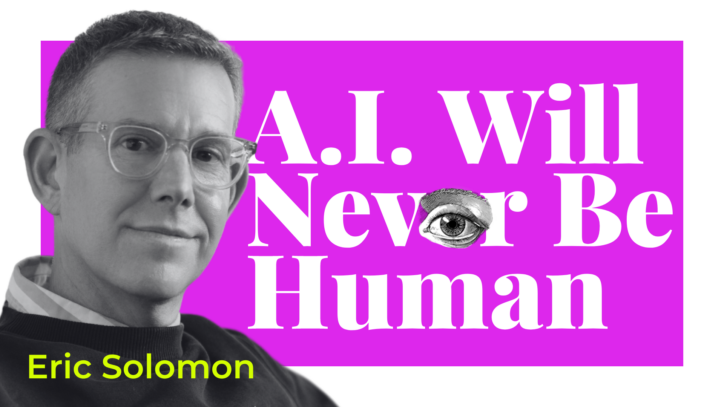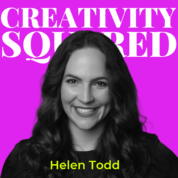
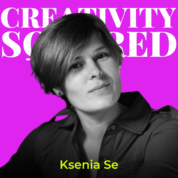
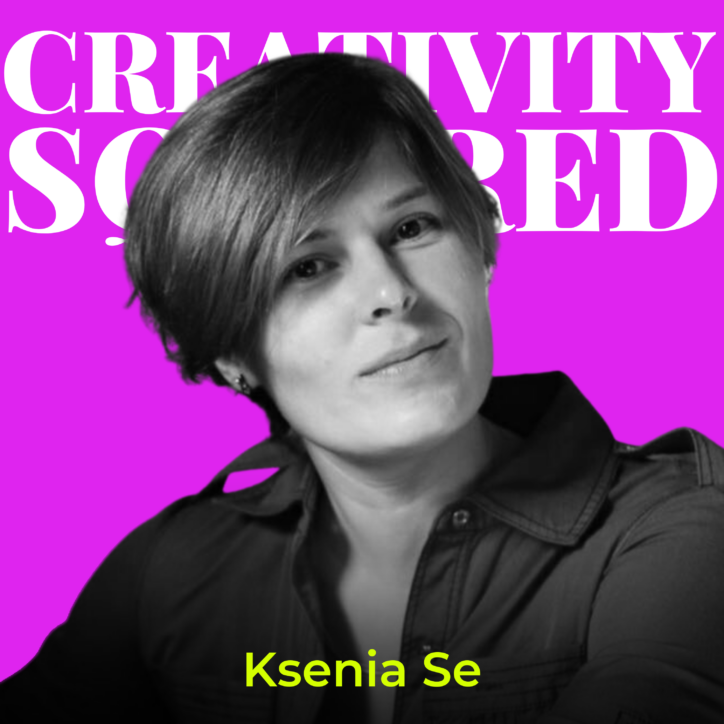
Ep24. A.I., Don’t Mimic Us: Expand Beyond Our Human-Like Thinking for Limitless Possibilities with Turing Post Newsletter Founder Ksenia Se
The latest episode of Creativity Squared takes us back to the genesis of modern machine learning to help us understand our present and predict our future with artificial intelligence.
“Artificial intelligence brings us this new level of literacy, which, if we let ourselves use it properly, will widen our imagination and our creativity. It will give more people the opportunity to be more human.”
Ksenia Se
Our guide and interpreter is Ksenia Se, a journalist and tech media entrepreneur who specializes in connecting audiences of all backgrounds with plain language news and analysis of A.I. developments. She is currently running her second A.I. content platform, Turing Post. She is the co-founder of TheSequence, an A.I. newsletter now with 164,000 subscribers. She is also a Member of the Board of Track Two: an Institute for Citizen Diplomacy. Ksenia was previously Editor-in Chief of Russian-language, open-source journalism platform, TheQuestion, as well as New York Chief Editor for The Snob Magazine. Her resume also includes positions in business and audience development.
Ksenia shares her journey from covering blockchain to artificial intelligence, and how the growing information gap in the nascent A.I. trend inspired her to launch a media product. She talks about using A.I. in her own work, and the future of humans augmenting our abilities with technology.
You’ll get a brief history of the development of machine learning, and the namesake of Ksenia’s website, computer scientist Alan Turing, whose fundamental questions about machine intelligence are only starting to be answered now.
Ksenia also discusses the slippery slope of attributing human qualities to machines, and whether we should rethink our assumptions about what A.I. will become. She thinks our worst fears say more about us than about the technology.
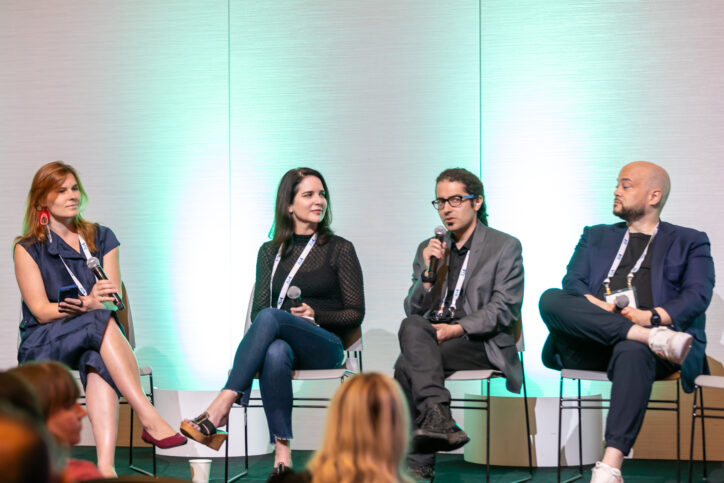
Finding a Niche by Filling a Need for A.I. Content
Ksenia started her entrepreneurial journey in 2018, when her reporting about blockchain brought her across the next big trend in technology, artificial intelligence. She began looking for literature to learn more, but didn’t find information that beginners like herself could easily absorb. She began thinking about what such a publication could look like if she applied her journalism and audience development experience.
She was regularly getting positive feedback about her idea in conversations with people at Columbia University, when COVID-19 started spreading and put a kibosh on exchanging ideas in-person.
Not long after, though, her friend and computer scientist, Jesus Rodriguez, suggested that they launch her idea on a small scale, as a newsletter. That’s how TheSequence was born.
They wanted to focus on education and show people what was happening in A.I. through explainer articles and product reviews. They started publishing on Substack, just as the platform was becoming popular, and before long their readership grew to 50,000.
“People started to know us in the community. It was an amazing feeling, like in the Internet era, when Google was just in the process of creation. Talking to all these amazing startups felt like, you know, in 10 or 20 years they will be changing this world. But now they’re so small, and they’re so eager to share everything. So that was a very, very exciting moment.”
Ksenia Se
The duo continued growing their audience over the next three years, and at some point Ksenia started working on the newsletter full-time. But she was still thinking about building a site that would offer more than journalism. She wanted to create a space for people to go, and where she could explore more of the A.I. industry, such as business implementation and A.I. applications in the art world.
However, Jesus wanted TheSequence to continue in the same direction, and so the duo split up. Ksenia started Turing Post in late June 2023, building the site up to a current readership of about 30,000.

Augmenting Human Ability With Artificial Intelligence
As the Editor-in-Chief of an A.I. news site, Ksenia is at the forefront of the latest developments in how A.I. can help hack productivity. She gains insights from her research that help to grow her audience by sharing them with her readers and by utilizing them in her own business.
For instance, Ksenia puts out a weekly digest every Monday called “Froth on the Daydream,” a reference to the surrealist novel of the same title by Boris Vian. In it, she often covers new releases from A.I. companies and test pilots new systems. As a result, Ksenia says that she uses a combination of A.I. systems to support her work.
“It’s like having this team of people who just might give you crazy ideas, might give you absolutely worthless ideas, but you’re the one who’s choosing. I still have people working for me, of course, but the machines are a great supportive creative tool.”
Ksenia Se
As a non-native English speaker, Ksenia says that A.I saves her huge chunks of time that she would otherwise spend in lengthy rounds of copyediting. However, she says that she still needs to put a human touch on the writing because A.I.-generated text is still easy to detect.
For that reason, she says that she doesn’t think A.I. will replace us, as so many fear. Instead, Ksenia sees A.I. continuing to be a tool that can augment human ability, as it is already.
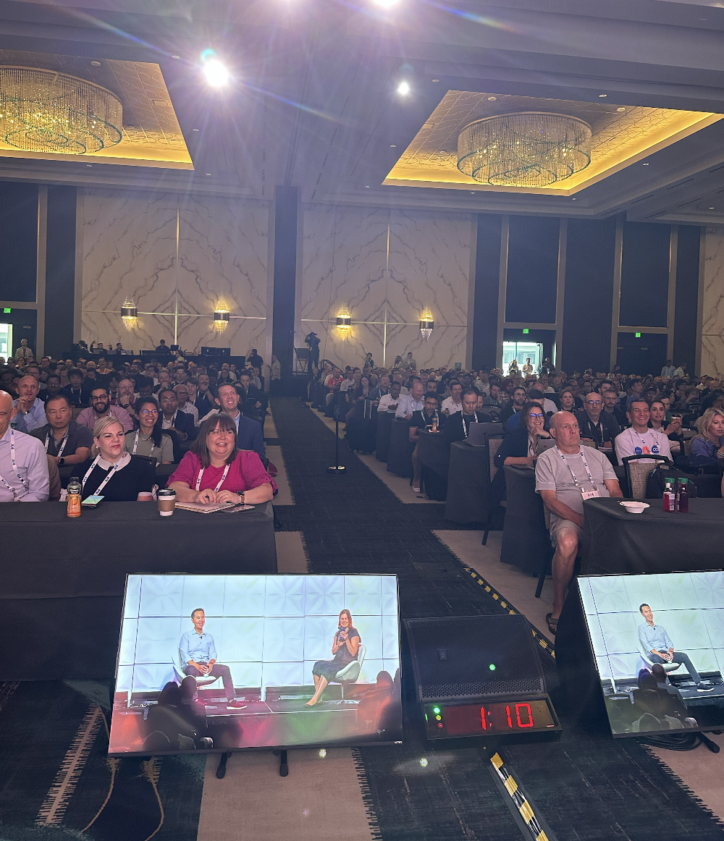
Unanswered Questions: Alan Turing and Machine Intelligence
The name of Ksenia’s current media venture is an homage to the father of machine learning, and one of the world’s first computer scientists, Alan Turing.
“One of the things that drives me writing the newsletter is because I feel this huge lack of knowledge. And this is my way to learn things. So I think if you really want to know a subject deeply, you need to go into its history.”
Ksenia Se
Turing played a key role in the outcome of World War 2 by developing a machine that cracked the “Enigma Code” that the Nazi military used to encrypt their communications. Turing’s life is featured in the Hollywood biopic, The Imitation Game, starring Benedict Cumberbatch.
“The Imitation Game” refers to the test that Turing invented to determine a machine’s ability to exhibit intelligent behavior equivalent to, or indistinguishable from, that of a human. The test imagines two entities chatting to each other from different rooms. Each human participant may or may not be chatting with a machine. The goal of the conversation for both sides is to convince the other participant that they are chatting with a human. When the conversation is over, if a human either thinks they’re speaking to another human, or is unable to tell, then the machine passes the test.
Turing’s success laid the foundation for new research into machine learning, with much of the early funding coming from the U.S. Military’s research division, DARPA. Research continued through the Cold War and beyond, until the quest for artificial intelligence hit a wall.
“The expectations were so huge, they thought that machines would just become this intellectual part of our life immediately. But the computational power was not there.”
Ksenia Se

Even though advances in cloud computing and chip design have ushered in a renewed frenzy for A.I. research, many of the questions that Turing posed in the 1950s have not been answered yet.
Ksenia says that the biggest unanswered question for her is the definition of intelligence. Turing was one of the first to think about whether machines could achieve intelligence, and it’s a question we’re still grappling with today.
Turing thought about machine intelligence in the context of a machine’s ability to mimic human interaction. That dynamic is the basis of the Turing Test (as the Imitation Game has come to be known). Now we have chatbots that can not only mimic human intelligence, but mimic specific humans’ accents, speaking mannerisms, and vocal pitch.
What’s beyond the Turing Test? The 2014 sci-fi film Ex Machina takes the Turing Test to its extreme, imagining a near-future reality where a female-gendered android is tested to see if it can manipulate a human man to help it escape confinement.
Yet, Ksenia disagrees with the assumption that an intelligent machine would possess all the same negative aspects of human psychology. She says that we humans need to be careful about anthropomorphizing machines by assigning them human pronouns (he, she) and using the language of human sensory reception to talk about their interactive capabilities.
“When we say they think, when we say they can hear us, speak to us, that’s making them human-like, so we already make them kind of pass the human life test. But that’s not the right language. I think we might need to come up with better wording for it, because they can’t really hear, they can’t really talk.”
Ksenia Se
She says that she sees cause for concern in some areas of the A.I. industry working toward A.I. therapists or A.I. “friends.” She says that A.I. is a useful tool, in the same way as GPS navigation, but A.I. cannot become the only form of interaction. Humans still need to be able to interact with the beauty of the real world and each other.

Expanding our Humanity Through A.I. Literacy
Ksenia is optimistic about the ways that A.I. can help us evolve and she’s skeptical about the concerns that A.I. will replace us.
Much like how a sudden jump in literacy rates in Britain during the 1800s contributed to the Industrial Revolution and the exponential acceleration of human progress, Ksenia thinks that expanding A.I. literacy will have a similar effect of increasing the rate of progress.
Additionally, Ksenia thinks that, if we can use it properly, A.I. will help to widen our imagination, our creativity, and give people the freedom to maybe become less machine-like.
“One of the next steps for humans, not that A.I. will take our place, but that we will be augmented, as we are augmented right now with these current tools, because having ChatGPT as my editor definitely is an augmentation of my writing capabilities.”
Ksenia Se
And by doing that, maybe we can take the time and energy to address some of our own negative thoughts, the aspects of ourselves that we fear the machines will mimic.
Links Mentioned in this Podcast
- Turing Post’s Website
- TheSequence of AI Knowledge
- Track Two: an Institute for Citizen Diplomacy
- The Snob Magazine
- Jesus Rodriguez
- Froth on the Daydream Novel
- The Imitation Game
- Ex Machina
- Turing Post — Anthropomorphizing article
Continue the Conversation
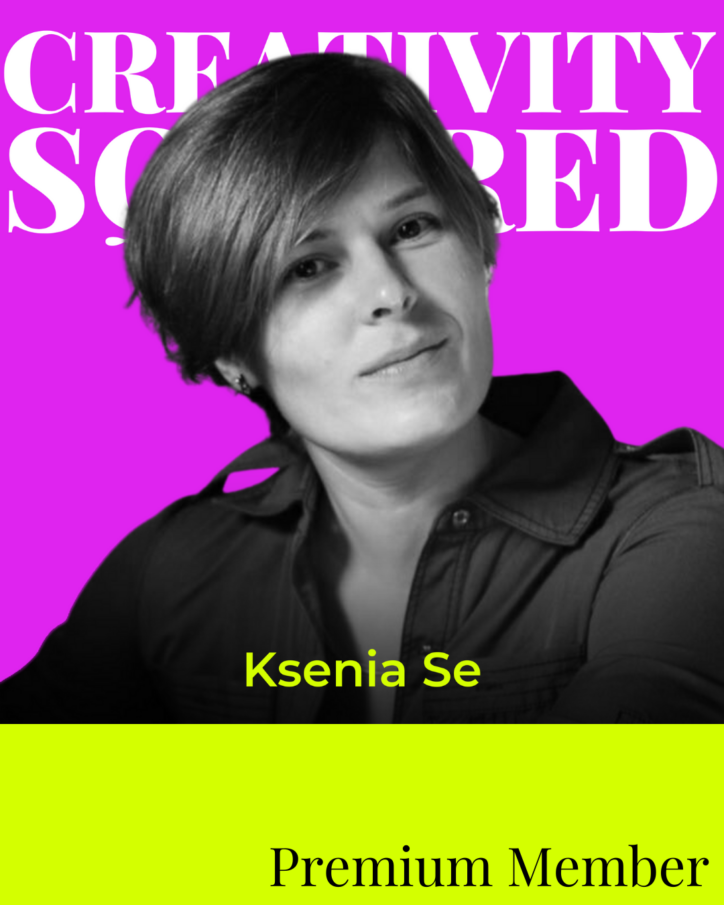
Thank you, Ksenia, for being our guest on Creativity Squared.
This show is produced and made possible by the team at PLAY Audio Agency: https://playaudioagency.com.
Creativity Squared is brought to you by Sociality Squared, a social media agency who understands the magic of bringing people together around what they value and love: https://socialitysquared.com.
Because it’s important to support artists, 10% of all revenue Creativity Squared generates will go to ArtsWave, a nationally recognized non-profit that supports over 150 arts organizations, projects, and independent artists.
Join Creativity Squared’s free weekly newsletter and become a premium supporter here.
TRANSCRIPT
[00:00:00] Ksenia Se: Dreaming is just such an unstructured thing that we don’t even understand what it is. So I certainly think that augmented people would be able to dream. And I think that’s one of the next steps for humans. Not that AI will come and take our place, but that we will be just augmented as we are augmented right now with these current tools, because having chat to PT as my editor, definitely is augmentation of my writing capabilities. Too much humanization of it.. and we talking about it in this article is that it just changes your perspective and it actually limits you because if you think just in this mimic human angle?
That’s not very wide. You need to have a bigger picture. You just need to explore every possibility of the machine or the algorithm. We as researchers should not limit ourselves.
[00:01:07] Helen Todd: Over 20 years of her career, Ksenia Se has donned many hats. From New York chief editor of a global media platform, to FinTech executive, to PR director at Moscow’s first contemporary art center, to journalist and even to a llama Walker. Regardless of her role, her passion for technology has always remained. In 2018, after a brief affair with blockchain AI and machine learning caught her attention and became her fields of self study. By 2019, she had started thinking about a media publication named touring post to feature digital avatars, articles written by robots, generative art, and more, but the technology wasn’t there yet.
Then in 2020, during the pandemic, Ksenia and Jesus Rodriguez conceived an educational AI newsletter named the Sequence. It became her gateway to machine learning where she currently spearheads partnerships. When the buzz around chatGPT grew, she revived her first idea and launched Turing Post, now serving as her AI canvas.
As an avid learner, Ksenia helps readers understand AI’s roots, its current impact on society, and where it might take us in the future. Importantly, she discusses how we might steer its course. Beyond tech, Ksenia champions citizen diplomacy. She firmly believes that even one person can affect change in the world.
She’s a board member at TRAC2, an institute for citizen diplomacy, and is writing a book about its history. She’s lectured globally, led the question editorially, and has articles and publications like Stratfor, Towards Data Science, Forbes, and more. Ksenia and I met through running newsletters that explore AI, and I couldn’t be more excited to bring her on the show.
We both share a passion for technology, curiosity, and learning. And if you haven’t already subscribed to each of our newsletters. The links will be in the description. In today’s episode, you’ll learn more about the history of large language models, known as LLMs, in addition to the importance of Alan Turing, how the Turing test is still relevant, and interesting questions Turing asked that we’re still exploring.
Ksenia also shares how she uses AI in her own work, thoughts on the future of humans augmenting our abilities with technology, and why we shouldn’t anthropomorphize tech too much, but instead should expand beyond our human like thinking to not limit ourselves and the possibilities of evolving with technology.
One question we explore is do machines think? Keep listening to find out the answer. Enjoy.
Welcome to Creativity Squared. Discover how creatives are collaborating with artificial intelligence in your inbox, on YouTube, and on your preferred podcast platform. Hi, I’m Helen Todd, your host, and I’m so excited to have you join the weekly conversations I’m having with amazing pioneers in this space.
The intention of these conversations is to ignite our collective imagination at the intersection of AI and creativity to envision a world where artists thrive.
Ksenia, welcome to Creativity Squared. It’s so good to have you on the show today. Hi.
[00:04:41] Ksenia Se: Helen, very nice to be here. And thank you for the invitation.
[00:04:44] Helen Todd: Yeah, well, it was so nice, we actually met because we each have newsletters that explore AI. But, for our readers and listeners and viewers who haven’t met you yet, could you share who you are and your origin story?
[00:05:01] Ksenia Se: Sure. So my name is Ksenia. Ksenia Se. I’m the founder and of the main creative power behind Turing Post. It’s a publication about artificial intelligence and machine learning. I’ve been doing so many things throughout all these years, it’s even hard to find a place where to start. But, my background is in journalism and currently my two passions are artificial intelligence and telling stories about it, educating people about it, understanding it better myself. And the second passion would be the citizen diplomacy, that it’s not the part of this podcast, but I just want to mention it. It’s important for me.
My journey started as a young PR marketeer for the art center in Moscow. And since then, art and creativity was a very important part of my thinking, of my way of enjoying life. But since then I’ve been doing journalism, and my main focus was always on technology. So, at some point when I moved to New York in 2018, and I’ve been living in New York before that, but that was sort of the second time when I moved to the city, there was the time of blockchain.
And I started to work for a company that was creating financial analytics about digital currency and they were using artificial intelligence to build this analytics. So, as a speaker for the company, I went to a lot of conferences, a lot of, you know, meetings, and I at some point realized that the main thing that I’m actually telling people about is not about blockchain, but it’s about artificial intelligence and what is it and how we use it, and what are the algorithms, and what does it mean. And at this moment in 2018, 2019, it was still, I mean, the narrative was basically the same.
It was as if artificial intelligence is going to come and conquer us, the terminators are going to kill us, we will, you know, become jobless and all that. But, when I was looking at my iPhone, when I was thinking about Netflix and all the recommendation systems, it is just so clear that machine learning and AI is just such an essential part of our life.
And we, so close day to this technology that we need to understand it better. So I started to learn more about it. And as a journalist, I decided to analyze what’s out there. Is there any industry that provides enough information about AI and machine learning? And it happened to be that there were the publications like Forbes that would push the agenda of killing machines or some hype topics.
All that was very technical, very interesting, but very technical publications like Tor, Data Science, Kiddy Nuggets. And they’re extremely useful when you have some experience, but it’s hard to to dive headfirst into them when you don’t really have enough knowledge. So that’s how I came up with the idea to think about another media publication that would connect the dots between all of the people who want to understand and the technology.
For my years, as I’ve been building communities and I’ve been working on these connections between different worlds. That’s why I decided to do the same with AI and machine learning. So, that’s what I do. I build Turing Post and I work on another project about citizen diplomacy with the TRAC2 institute for citizen diplomacy.
And they might not be related from the right side, but they’re all about us being a human and learning from the experience, learning from history and building a better world. And you know, we’ve started in late June, now it’s October and we have 30, 000 readers. It’s it’s all very fascinating.
[00:09:18] Helen Todd: Congratulations on growing your newsletter so much out the gate. And we both use Beehive, which is a great newsletter platform that we both very much enjoy and recommend, and we’ll be sure to include all the links in today’s episode. Well, when we first connected and we’re going to dive more into some of the content in the series that you have on touring posts cause it’s really great and really in depth and there’s definitely a clear distinction between what we do and creativity squared and how deep you’re going into some of these topics.
But when we first connected and I mentioned, you know, the subject matter of how creatives are collaborating with AI. As a journalist and a non-native English speaker, you’re immediately like, “Oh, it’s helped me so much with my writing.” So I was wondering if we could kind of start there, how you’ve personally used it as well in writing your newsletter.
[00:10:10] Ksenia Se: Yeah. So, writing is always easier for me in English because you have time to think when you speak, you make mistakes and whatnot. But even if you spend many years writing in a foreign language, you’re not fully capable of being as clean with all the grammar and all the coherence as you are in your own language.
So for me it would be always like you write a text, you write an article, and then you have an editor and then you know, you do another round of edits and another. So it’s like very long process. So when chatGPT appeared, it was very like, people still talk a lot about how AI is going to do that..how we are going to, you know, lose all our jobs.
But I use it a lot and I know that it’s an amazing tool and if you are a professional that just enhance and augment your own professionalism makes you better and saves you time. So, I don’t believe it’s a matter of either or it’s just a matter of using all these tools for your creativity for your precision for you know saving you time and giving you more freedom actually being like more creative with other topics. So yeah, it’s been a great tool since then.
And the way I interact with chatGPT, it’s first of all I use bunch of them partly because I’m writing my Turing Post overview, which I call the Daydream on Mondays because the Froth and the Daydream is an allusion to the novel by Paris, and it’s like this… So just the allusion to this. Kind of dreamy world with we not really certain about we don’t really know what’s coming out of it.
It’s it can be either a very solid and real or it can be all just a dream. So because I write this every week on Mondays, I do overview of a lot of other newsletters research papers and tools that i’m writing about. So I’m using all of these, generator generators and editors And I just find it so much more convenient to kind of cross use.
Let’s say Claude and chat GPT, and then Bing for something else and Bard for something else because they all can give you a slightly different angle. And it’s like having this team of people who just might give you crazy ideas might give you absolutely worthless ideas.. but that you are the one who choosing and you are the one who just yeah, that might be interesting.. Let me use my brain now and combine all these things and make it really interesting to read. So yeah, I find these tools to be a good team. I still have people working for me, of course, because it’s it’s just impossible to do only with machines. But, the machines are just a great support of creative tool.
[00:13:37] Helen Todd: That’s great. I love that. I know when I’m writing the subject line for the newsletters, instead of bugging a gal on my team of like, cause I overthink the emojis, every word.. I’ll literally put it into chatGPT, like a couple of variations with like, which one is the best? And it will analyze them and tell me why one is stronger, what my goal is, so I found that just in getting feedback in it, analyzing ideas that I come up with, like super helpful and interesting. Do you have any like go-to prompts or things that you’re always using them for with your newsletter?
[00:14:14] Ksenia Se: I certainly use these special settings in chat GPT pro when you can just give a permanent prompt to chat GPT.
So, it knows who you are what you’re working on, what do you like, how do you like it’s to be written, how do you like this thing to communicate with you. So, this is very helpful I do have a couple of prompts, but I, first of all, I’m very like practical with it. So, it’s not that I’m creating with something new that I’m selling just as it is.
I’m more like check grammar. Don’t change the style. Let’s say, that’s my biggest problem. But, then also what I do is that I write a little story how I would write it, then I add small pieces of information that I want to include and I say, okay, now like weave it together.
And then when it does that, what I find interesting, maybe because when I was studying journalism, my speciality was like, text analyzing so I really can analyze text pretty well, and it’s very easy for me to distinguish which text was written by chat GPT and which one by human because working with chat GPT for the last three four months.
I actually know what words it likes to use what structure it prefers how it does it and it’s like it’s quite obvious. So, when it gives you this you know draft, it’s very well what I like how it does. It’s like very well connects the things and then you basically rewrite it to make it sound really interesting. Because if you just put it as it is at some point it will be like all this you know, generated images when you look at them and they are different, but are they really, because they all kind of look the same with, you know, all this majority illustrations.
So that’s why also, I don’t believe we will be challenged by AI so much because it’s still really algorithmic. It’s what it’s doing, it is an algorithm.
[00:16:36] Helen Todd: Yeah, I don’t think that there’s a word for “uncanny valley” for text, but you can definitely I know I have an eye for some copy I’m like that definitely sounds like chat GPT wrote that. So, maybe we can coin a term for text that sounds too robotic.
We’ve had corporate speak then social media, which is more casual. Now we’re doing natural language and then computers reflecting natural language. So, I’m sure a word will come out. Well, cool. Tell us you have a great series on the history of LLMs and your newsletter is named after Alan Turing.
So, let’s dive into what you covered there and then where Alan Turing fits into all this because our readers are not quite as technical as yours. So, this will be a great introductory to kind of like the history of how we got to where we’re at and how or why chat GPT was able to flourish as much as it did last fall.
[00:17:43] Ksenia Se: Yeah. So one of the things that drive me writing the newsletter is because I feel this huge lack of knowledge. And this is my way to learn things. So, I think if you really want to know some subject deep you need to go into its history. So, that was quite…and this was one of the first ideas that we came up with that if we want to explain people what LLMs are how they work and where they taking us we need to explain also where are they coming from.
Because I see it as a complex thing when you need to see past, the present and the future to build this whole picture in your head. So LLMs at this point were blooming, hyping, and just the main conversation. So, we just decided why not should we should just go back into the history and see how, what are the roots of exploration of research for a large language models.
And the large language models are part of a bigger thing, which is called foundation models, but we decided to start with language models. So our main focus was to see what has been done with language in terms of machine learning, and when did it start. So, it turned out to be that this whole thing started from machine translation, and I highly recommend your readers to read this series, they are not really technical.
We tried to make it as… Comprehensive as possible. And also because it’s a story, we wanted to put some highlights on people who were involved in creating this whole research and working on it because the, because forties, fifties, especially fifties was so reach with this amazing scientists and researchers and they all coming from different angles. What i’m trying to say is that at this point a lot of terms were coined and people started to think about automation and about how to try and build this computers that were on people’s mind for centuries actually before that.
And because we, you know, the 20th century has became this industrial revolution. We got power, we got things that we could work to actually like build this machines and also we had this huge wars that actually required to have, this special tools to be able to, you know, be better than your enemy.
So, machine translation actually became a really hot research topic when the war was when it was the second World War because Americans needed to understand what Germans were doing.. and when the Cold War started, that was very research and development stage, because how would you understand this crazy Soviets?
What are they working on? How do we translate? Can we translated much faster? So a lot of budget money was channeled to make it work. And when you read this, the history, you understand really and some people know that like the internet was initially the governmental, the military network that at some point just became public, but all the research was paid by the governmental money. The same with artificial intelligence machine learning, in 20th century. DARPA, the agency, was putting millions into their research.
And it was the way that, especially a lot of thing was for some reason for Air Force. So they had this huge budgets, but they didn’t have really a good strategy because probably not very many people understood. What is it? What is like, where is it taking us? But they had a bunch of this smart super smart people that were working all this algorithms and machine translation on trying to making machines play chess. So, the decision making process was just like well, this is a good scientist, we’ll give him money.
And if the scientist says, well, this is another good scientist who has a good idea, we’ll give money to him. So there was basically no control, but because it was like just a small bunch of people who were all very interconnected and they really were very interested in the research, like the money went the right way.
But it was just very interesting to learn that there was like literally no understanding what’s going on and how it can be, how it can be used, which eventually led to AI the first day. I went here because the expectations were so huge that they thought that machines would just become this, you know, actual part of our life immediately, but the computational power was not there.
There was not enough even data, but mostly computational power was just the compute was just not enough. So, but going back to Alan Turing, what always fascinated me is that he was such an outcast basically, but he thought of the machines and their capability to think very early. So he wrote this paper.
I have it right here. Computing Machinery and Intelligence published in a quarterly review of psychology and philosophy. So, these were the places where people would publish their papers about machine learning because in fifties, there was no such science as computer science. So, he was the first who asked this question, can machines think?
And, of course we have a long history before that of human like robots, even Frankenstein is partly sort of artificial intelligence because it’s just this constant desire to build something that can think, that can be as human. But he was.. he thought about it the way that we’re thinking about it now.
So, I was reading this paper and the questions he poses is just the same questions we either just solved or we’re still coming to solve them. So, if you think about it, it’s 73 years ago. This person just… the war just finished, basically. He worked so hard on Enigma and on this deciphering machine that helped crack the German code.
And he just never stopped. He was just, in this, in his mind, machines, good thing. In his mind, that was all happening. He didn’t have enough resources. He probably didn’t have enough support, but it’s fantastically contemporary paper that he wrote 73 years ago. So, my intention was…like the whole intention of Turing Post is to connect the dots.
So. I thought that people should know what aAlan Turing was up to what he was thinking about. What John von Neumann was thinking about? How all these amazing people working together.. what happened on this Darmouth conference that literally, you know, changed the world. And, that’s when artificial intelligence at least as a term started because it still comes to us all.. those ideas were still working on them.
So, I always believe that if you learn what people were thinking about and it’s still not done, you can just take this idea and maybe now we can do it. So yeah, I believe Turing would be really fascinated by what’s happening right now with all this.
[00:26:51] Helen Todd: I’m sure. Well, thank you so much for doing a deep dive and history and preview of what’s in your LLM’s history series.
Well, one question following Turing, cause you mentioned that there’s a few questions that he posed that we’re still working on today. And I was wondering if any stood out to you as being like really interesting or that you think will solve soon, or just…like interesting questions that we’re still working on that, that you can share with us?
[00:27:20] Ksenia Se: I think what is interesting is the conversation that’s ongoing about the intelligence and what is it? What the intelligence is? What consciousness is? And if it’s really important because for Turing, it was not as important. It was not actually about like the machine’s actual thought process but it was more about the ability to mimic, like to mimic human-like responses.
So, in terms of Turing test I believe this large language models can pass it because they are really well mimicking humans. But, it’s funny. Can machines think? I don’t think we have answered to this question and this is still the back, the biggest question because we don’t really know what intelligence is and what consciousness is.
So, I think coming from Turing and still ongoing, we just need to think about these questions and that would be this huge discussion for the next couple of months, years, because if we know, like when we answer these questions, we would probably know more about how we’re going to live with machines.
And how we want to limit or not limit them. And also maybe we should just shouldn’t think in human terms, if we’re speaking about machines, because somehow a lot of people apply that machines would be bad to humans, that would like to extinguish us, but it’s a human way to think about it.
Other things, because we want to dominate who told us that the machines wants to dominate us. They are machines. They might not think that way, if we can say that. So, that’s, I think, what would drive the research and all the philosophical environment around it.
[00:29:37] Helen Todd: Yeah, I love that with these chatbots and whatnot and where we’re at with the current AI.
It’s just a big mirror. And we, like what you said, we haven’t figured out what consciousness is, intelligence, and with AI, it’s just a big mirror showing us back who we are, the way that it’s been trained through the internet, but also what we don’t know about ourselves. So I think it’s just a really interesting time, really what we’re learning about ourselves.
Or the gaps that we still have yet to learn using AI as a mirror.
[00:30:09] Ksenia Se: That’s true. Yeah. Yeah. We’re learning a lot about ourselves.
[00:30:13] Helen Todd: Oh, and I was speaking to someone the other day and she said something interesting that at the industrial revolution, she was saying that we’re comparing humans to machines and now machines to humans.
Yeah. But I like what you said that maybe we shouldn’t center ourselves around the language for machines, but that’s so human to center ourselves at the same time.
[00:30:37] Ksenia Se: Yeah. I was just thinking that it’s quite interesting that the Imitation Game paper by Turing was published in psychology and philosophy.
Maybe we should just come up with a machine psychology and, you know, different type of philosophy and not depend on our human flawed psychology and philosophy.
[00:30:55] Helen Todd: Well, for those who don’t know what the Turing test is, I think it’s worth explaining because it has a lot of implications right now with how we do interact with AI specifically through the chatbots.
So can you, for those who may not know or may not have seen the movie, The Imitation Game with actually, I don’t know if that’s covered in that movie, but the imitation game with Benedict Cumberbatch is a great feature film on Alan Turing. If you haven’t seen it, definitely recommend. But what was the other movie?
Oh, Ex Machina. Ex Machina does an amazing job exploring the Turing test and I highly recommend that film for anyone who hasn’t seen it. But I digress. Tell us what the Turing test is.
[00:31:41] Ksenia Se: Yeah, I love the Imitation Game movie. But it doesn’t cover the Turing test. It’s focusing on the developing the Enigma machine the translation machine. The Turing test, also called the Imitation Game, is when you text chatting with two people entities, someone in separate chat rooms and one is a human and one is a computer and both try to convince you of their humanity.
After this conversation, you can tell, you can reliably tell who is who, then the machine is said to have passed the Turing test. And again, I was saying that before, but this test is actually underpins the foundation questions. Can machines think or behave like humans, but in terms of not actually a thought process, but can they have this ability to mimic a human like responses and the capabilities of current foundation models. And just for the audience to understand the difference between foundation models and large language models is that foundation models is just wider term.
For text, image, video, sound and when large language models is just about text. So, currently the capabilities are so huge and especially now when we come into this multi-modality world when we can do text to image, text to video, image to video text or whatever, and just this whole mix of things. I think it’s we can say that they can mimic humans pretty well.
I’m not really aware of a good next step after the Turing test, but what you said about Ex Machina, again, I think the idea of Turing test is very well implemented in it, but also the view is very human way of thinking. Because for some reason, we just assume that this machine would want to act like a human and that she has all this billion thoughts, but how do we know that it has it?
It might have a completely different psychology. So, I’m kind of struggling with myself right now because we also published a very good article about anthropomorphizing artificial intelligence. And it’s a big and very important question because when we speaking about the machines using she.. that’s like making it human like already.
When we say they think, when they say they can hear us, speak to us, that’s like making them also humanlike. So we already make them kind of pass the human like test because we make them humanlike. But… that’s not the right language. Actually, I think we might need to come up with a better wording for it because they can’t really hear, they can’t really talk, there’s something, and I don’t really know what’s the right thing to, how to talk about it, but we should not anthropomorphizing it. It was too much.
[00:35:05] Helen Todd: Well, I know Rafiq Anandal, who came up in a conversation for a recent podcast. He’s an AI artist and he really explores the question, if machines dream, what does that look like? And I love that question. It kind of captured my imagination, but it’s so nicely put. I guess, it’s still, you know, associating human dreaming to machines, but I still love that question that he explores.
And we also had Eric Solomon as a guest on the show. And one point of that episode was AI will never be human. And he found it actually problematic that if we think the machines are responding as like human, like, especially when it comes to empathy and we might not tell the difference that’s not good for us because we need to connect with people who have lived experiences and who are empathetic and whatnot.
So, it’s definitely an interesting time to, to explore these subjects of what it means to be human and, you know, what Turing poses of.. if we can’t tell the difference, does it even matter? But I think I’d lean towards Eric. That it does matter, especially on certain subjects that we are connecting with other humans, especially on an empathetic level, but curious your reaction or thoughts.
[00:36:19] Ksenia Se: Absolutely. Yeah. First of all, I wanted to add to Rafiq Anandal and I really love his art. And I think this exploration of this huge mass of data and how he perceives it for his creativity. It’s a, you know, it’s a pure creation just based on a completely different media. The artists are always famous for playing with different media.
So in that sense, I can just admire how he utilized what he has with all this machine learning experience. He had ..can machine think? Would be it’s funny, I kind of think that the machine can think because we can build an algorithm and it’s just more direct to construct this thinking process, especially for a task.
But dreaming is just such an unstructured thing that we don’t even understand what it is. So I certainly think that augmented people would be able to dream. And I think that’s one of the next steps for humans. Not that the AI will come and take our place But that we will be just augmented as we are augmented right now with these current tools because having chat GPT as my editor definitely is augmentation of my writing capabilities. Too much humanization of it and we talking about it in this article is that it just changes your perspective and it actually limits you because if you think just in this mimic human angle, that’s not very wide.
You need to have a bigger picture. You just need to explore every possibility of the machine or the algorithm. We as researchers should not limit ourselves. And we as humans, and I think especially it’s important to like observe kids, how they interact, how they learn empathy. We can’t teach them some basics, how to show emotions, how to talk about your feelings, how to show empathy, but it’s basic thing.
You really learn how to do it just getting this experience human to human. And sometimes it’s enough to yell at your Siri and, you know, just let out the anger, but it’s not therapeutical. You can use these tools as support, I think. But I’m doubtful about all this AI assistants that some companies working on that are supposed to be like your therapist, like your friend.
I find this concept very scary, not because it’s really going to happen. I think if it’s just a support for all, it’s amazing as having your GPS navigator is helpful, but also it cannot just be the only thing. You still need to be able to see this world in this beauty and this variety of things.
[00:39:47] Helen Todd: I reference movies a lot just because there’s such an easy, I guess, reference point.
For lack of better words but what you said, like humans are limited. I think sometimes we don’t like to think of ourselves as limited. But we are. And one movie that came to mind, as you were saying that is Lucy. I’m not sure if you’ve seen it, but it has Scarlett Johansson in it. And I think it does a good job of capturing the possibility of machines doing so much more, although it was technically like.
A human brain at a larger scale. So, maybe that’s not the best reference point, but that we’re just so limited and even thinking about machines. But then, you know, if I think this is one of the interesting parts of this conversation is, well, if we can’t imagine it because of our own limitations to our imagination, like what’s beyond our imagination and what’s the reference point to get there.
And, you know, I don’t think we, we figured that out yet. So, I think that’s an interesting thing. And you know, new discoveries or something might help us with the imaginative bridge to really understand.
[00:40:54] Ksenia Se: I think if I want the viewers to remember one thing is, I think that’s why the history part of education is so important and that to really understand what’s going on and where are we moving to is to have this whole picture in front of your eyes, because that’s what actually gives you more space, gives you more freedom to think, gives you the opportunity to be more creative.
Because it’s the way we can think about literacy at some point, just let’s say. Not sure if my numbers are right, but let’s say 10 percent or 5 percent of people know how to read and write and they had this freedom of creating new stuff. Now, I think that’s what actually the artificial intelligence brings us this new level of literacy.
Which if we use it properly, and if we let ourselves use it properly, I think that will widen our imagination, our creativity, it will give just more people even the opportunity to be more human to realize what are the flaws that we are so scared of because that’s exactly why we afraid the machines. We are afraid that they will take all the bad parts from us. Maybe we just need to realize them, educate ourselves and become better people.
[00:42:21] Helen Todd: I love that. And one thing that I heard that I thought was a good example of what machines in the positive possibilities. It’s a researcher from MIT, Ramen. He said, like, could you imagine instead of just one Einstein trying to understand you know, the nature of reality. That you have ten Einstein’s that are trying to figure this out. And with all these AI tools, we’re going to have he used the reference point of Einstein, but like all these Einstein’s working on some of the biggest questions that we haven’t figured out. And, you know, I found that as like a great reference point to help bridge what, what could be as well. But I love what you said. Just be better humans. That will be a good starting point.
[00:43:09] Ksenia Se: Yeah, but that’s what the, that’s what moved the world. The literacy moved the world so much further because in 20 centuries, when so much more people learned how to read, how to write… this whole revolution of technologies happened.
[00:43:23] Helen Todd: That’s so true. Well, it has been such a pleasure having you on the show. I’ll be sure to put the links to where everyone can sign up for your newsletter and do a deeper dive into the subjects that you spoke on today and Vice versa for anyone listening that’s new to Creativity Squared.
We’re gonna cross promote the interview on both of our newsletters and platforms and it’s been such a pleasure. So thank you for sharing some time with us today And giving us a preview of all the good stuff that you have on Turing Post.
[00:43:57] Ksenia Se: Thank you so much. Helen. That was a pleasure and interesting talk. Yeah, I think we need to think more about AI and creativity and how we can use it.
[00:44:05] Helen Todd: Oh, we’ll have you on the show again.
I had to do a deeper dive on that conversation. Cause I, I’d love to talk with you about that too. So, well, thank you again.
Thank you for spending some time with us today. We’re just getting started and would love your support. Subscribe to creativity squared on your preferred podcast platform and leave a review. It really helps. And I’d love to hear your feedback. What topics are you thinking about and want to dive into more.
I invite you to visit CreativitySquared.com. And while you’re there, be sure to sign up for our free weekly newsletter so you can easily stay on top of all the latest news at the intersection of AI and creativity. Because it’s so important to support artists, 10 percent of all revenue Creativity Squared generates will go to ArtsWave, a nationally recognized nonprofit that supports over 100 arts organizations.
Become a premium newsletter subscriber or leave a tip on the website to support this project and ArtsWave. And premium newsletter subscribers will receive NFTs of episode cover art and more extras to say thank you for helping bring my dream to life. And a big thank you to everyone who’s offered their time, energy, and encouragement and support so far.
I really appreciate it. From the bottom of my heart, this show is produced and made possible by the team at Play Audio Agency. Until next week, keep creating.



